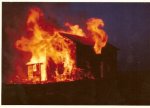“By failing to prepare you are preparing to fail.” — Ben Franklin
An emergency is usually sudden, sometimes unforeseen, but always requires immediate action. Emergencies will vary due to location but can include disease, earthquake, fire, flood, hurricane, lack of power, terrorism, tornado or tsunami. None of these events are pleasant to think about, but preparation requires pre-planning.

NO MATTER WHERE YOU LIVE OR WHERE YOU VISIT, you are at risk for contagious disease, power outage, terrorism or fire. If you live on the coast, you should also be prepared for tsunamis and hurricanes. If you live in an area prone to tornado, earthquake, flooding, blizzards or avalanche, you should be prepared for those. For instance, in the last 100 years, the area where I live has suffered damage or loss of life from flood, flash flood, tornado, derecho (windstorm), snowstorm and blizzards. It would be wise to take precautions and make sure my family is knowledgeable in case those things ever happen again.
Don’t be HOOD-winked: Know your neighborhood
You don’t have to have tea with your neighbors, but it doesn’t hurt to know them and know who regularly visits them. This is about being aware of your surroundings and keeping your family safe. It’s also a good idea to have the phone numbers of a few of them. There is power in numbers. Do you have elderly or disabled neighbors who would need help in an emergency? Don’t hesitate if you are able, an emergency situation is the wrong time to test the validity of karma.
What are you waiting for?
* Familiarize your family with two places they can meet you in the event of an emergency, one within the neighborhood and one outside of it.
* Keep all your vehicle’s gas tanks at least half full at all times.
* Keep cash on hand, at least $100 in small bills. 
* Talk to your family about possible escape routes from your home in the event of different types of emergencies.
* Make sure all family members know how to use a fire extinguisher.
* Make sure all family members have a contact number memorized that everyone can call in case you are separated.
* Locate gas main and other utilities, and make sure all family members know when and how to turn them off.
* Practice different scenarios during different types of emergencies regularly.
FIRE!
Make fire drills something you do monthly if you have kids. They will especially benefit from the repetitiveness to help them remember what to do in an actual fire. Make sure they know two ways out of every room. Remind all family members to crawl on the floor because smoke rises, to check doors for heat before leaving a room, and to stop, drop and roll if their clothes catch fire. Emphasize getting out of the house quickly and that once they have left, they MUST NOT re-enter the house for ANY reason. Have a designated neighbor’s house to meet at and instruct everyone to go there and to call 911. Make sure you keep important documents in a fire-proof safe or at a secure location. Check batteries in your smoke detectors every time you have a drill.
Inventory
Filing an insurance claim a horrendous activity if you have just experienced a loss. You will be asked to provide minute details, and the more timely and accurate the details, the more likely you will receive a faster and more accurate settlement. Make a home inventory of everything. Even if an item isn’t valuable, it will still require replacement. Whether you document your inventory on paper, by photographs or video, make sure you have more than one copy and that at least one copy is offline. Important things to remember are:
a. Take pictures of both the inside and outside of your home, and of each room within your house. This will help you to list your items, and will provide evidence of the item’s existence if needed later.
b. List items by room and take notes on specific information, such as serial numbers, purchase prices, date of purchase and present value if known. It might be worth it, especially for valuables, to have them appraised.
c. Scan photos and receipts if available. This saves you having to enter so many details.
d. Update your inventory at least once or twice per year, or sooner if an expensive item has been purchased or sold.
e. Here is a list that can help you remember items:
- Appliances
- Books
- China and Flatware
- Clothing
- Collectibles, i.e. stamps, coins, art
- Computer, Electronics & Accessories
- Furniture
- Jewelry and Watches
- Musical Instruments
- Toys
- Vehicles
- Wine/Spirits
Documentation
Gather these items now:
* marriage license/divorce decrees
* passports/travelers’ checks
* driver’s license/professional licenses
* insurance policies, numbers, information
* wills/trusts/deeds
* financial statements
* prescriptions
Store copies outside of your home in a safety deposit box or with a person you trust.
Go-Go Gadget!
Buy, borrow or beg a back pack or a rolling suitcase for every member of your family and attach an ID tag to it. After this has been done, put the following items into each one:
* flashlight
* battery operated radio
* batteries
* pocket knife
* change of clothing and shoes
* emergency money (small bills and quarters)
* local map
* food and water
* photos of family and pets
* emergency phone numbers
* list of medications
* allergies and medical conditions
* copies of health insurance and identification cards
* extra prescriptions
* first aid supplies
* personal items
* tooth brush and paste
* extra keys for your home and vehicle
* Don’t forget a Go kit for your pet. Theirs should include an extra collar, ID tags, license information, crate or carrier, food, water, medications, non-spill bowl, manual can opener, plastic lid and a recent photograph.
Go Long! (Disaster preparedness for a minimum of 72 hours)
Several manufacturers make plastic, sealable containers in many sizes and shapes. Buy some with carrying handles that make them easy to transport. Clean trash containers with tight-fitting lids are another choice. Buy a variety of container sizes that you can pack into your car in a short time if necessary. Include the following:
* Food and water
* Manual can opener and cooking utensils
* First Aid Kit and instructions
* Copy of important documents and phone numbers
* Warm clothing and rain gear for every family member
* Heavy duty work gloves
* Disposable camera (specifically for documentation of damage for insurance claims)
* Liquid bleach and an eyedropper for water purification
* Personal hygiene items
* Prescriptions and/or medical equipment
* Basic tools
* Heavy duty garbage bags and a bucket
Master Binder
This will be an important and useful gift for a spouse or friend in case of an emergency, such as a sudden illness, hospitalization, or funeral. It will help them keep your household running. It can also be a great friend to you in time of need, when it’s not easy to think clearly. Make sure to include:
* important phone numbers
* shopping lists
* lists of prescriptions and dosing information
* bills and cleaning checklists
* maps to nearby locations
* menus for local establishments
* written instructions for a babysitter
* central family calendar, birthdays and special occasions
* family and pet information
Hurry up and wait!
If you’re prepared, things will automatically go more smoothly. Just take things one step at a time and do not panic. Some of us will never have to use these preparations, and most will be used for minor situations. But, reality teaches us there’s always the possibility of an emergency.
Being prepared is the key to getting back to a normal life as soon as possible, after the situation has passed.
Related articles
- Emergencies Affect all of Us, Including our Pets (valleyranchassoc.wordpress.com)
- Hurricane tips that patients and health professionals should know (kevinmd.com)
- Preparing for emergency (lostincolonisation.wordpress.com)
- This Is Already the Worst Year for Natural Disasters (lewrockwell.com)









Recent Comments